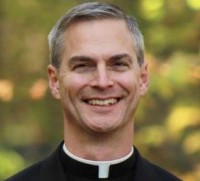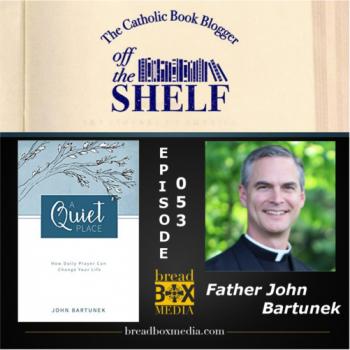 PETE: In our secular world seeking God seems to be the last thing on many people’s mind. What is your hope for your book Seeking First the Kingdom?
PETE: In our secular world seeking God seems to be the last thing on many people’s mind. What is your hope for your book Seeking First the Kingdom?
FATHER JOHN BARTUNEK: Well, as I mention in the introduction, this book is not meant to convince people to think about God. I agree with you that there is a need for that, but this book will not meet that need. This book is written for people who are already experiencing a desire to deepen their relationship with God. If you are feeling a thirst for God and an excitement about your faith for the first time, this book is for you. If you have been living your friendship with Christ for many years and feel a need to refresh that friendship or to take stock of how you are doing, spiritually speaking, this book is for you.
I also hope that this book will find its way into the hands of the many spiritual directors and confessors out there who are always looking for tools to help the people they are serving. This book was conceived from the beginning to be substantial, but practical. It includes generous portions of philosophy and theology, but always in the context of “What do I need to do in order to cooperate as best as I can with the Holy Spirit’s action in my life?” A great tool for spiritual directors and confessors.
PETE: How did you develop the structure for this collection of 30 meditations?
FATHER JOHN BARTUNEK: It flowed from two sources. First, the Great Commandment of Jesus: “You shall love the Lord your God with all your heart, soul, mind, and strength…” The book is divided into different parts, each of which delves into what is meant by those four terms. The heart is about our fundamental desires and the choice of our life’s direction; the soul has to do with how our emotions and feelings are meant to be linked to our relationship with God; the mind has to do with forming our intellect under the light of faith; strength refers to forming our will, our capacity for making choices and sticking with them.
The second source for this structure was the Church’s teaching about Christian formation in general, and specifically the formation it envisions for priests. St. John Paul II wrote an Apostolic Letter on the formation of priests, and another one on the laity. In both of these, he wrote about these four dimensions of the person and how each one needs to be developed in order to grow to spiritual maturity.
The division into 30 short chapters, each replete with quotations from Scripture, questions for reflection or discussion, and suggested applications to daily life of the principles discussed, came from my experience as a teacher, confessor, and spiritual director. Too often, I think, we try to rush ourselves to spiritual maturity. But in fact, as human beings we need time to digest and assimilate the truths that Our Lord gives us in the Gospels. By creating a book of 30 short but substantial chapters, I was hoping to enable readers to use the book as a 30-day spiritual retreat tool, or a 30-week small group study tool.
PETE: One take away from your book that hit home with me was the point that our relationship with God relies on 99% of God’s effort and 1% of ours. Despite the relatively low input on our end of this relationship why do you think it seems people find it so difficult to work on this relationship?
FATHER JOHN BARTUNEK: Because this relationship happens only in faith. If I want to improve my tennis game, I don’t need any faith. I can touch, see, and feel everything that my coach wants from me, and I can measure my progress and experience it tangibly. Our relationship with God isn’t like that. It happens through faith. As St. Paul put it, “We walk by faith, not by sight” (2 Corinthians 5:7). As modern westerners, we are inordinately attached to material standards and experiences. Walking by faith, which is a spiritual journey that takes time and trust, goes against the grain for us.
This is one of the things that causes me the most pain as a priest: Seeing people give up on God or on their pursuit of God simply because they don’t see the fruits that they expect, the results that they want. I hope that this book will help people adjust their expectations and give them hope – we do have a part to play in our spiritual growth, but even when we are doing our part, the growth may be happening in hidden ways.
PETE: For those who have not read your book yet can you provide us with a few tips on building our relationship with God.
FATHER JOHN BARTUNEK: In my work as a confessor and spiritual director, I often run across people who over-emphasize one or another of the things we can do to grow in our relationship with God. One of the main themes of the book is the importance of keeping a healthy balance between the different dimensions that need to be constantly addressed. St. Thomas Aquinas used the image of a hand – as a child’s hand becomes an adult’s hand, all five fingers grow together, not one at a time. As we seek to deepen our relationship with God, we need to pay attention to all four dimensions: heart, soul, mind, and strength.
This means that in the first place we need to keep developing our life of prayer: vocal prayer, mental prayer, and liturgical prayer (especially the sacraments of the Eucharist and confession).
But we also need to be developing our understanding of God’s Word, our knowledge of God’s ways. Spiritual reading and study need to be an ongoing part of our Christian life. There is always so much more to discover!
At the same time, we need to learn to educate and integrate the mighty power of our emotions into our relationship with God. This is extremely hard for people in today’s world, because a culture infused with consumerism has impoverished our emotional world and left it sadly underdeveloped. I go into this in detail in the book.
Then, we need to intentionally imitate in our daily lives the virtues that Jesus exemplifies and teaches. To do this requires self-discipline and perseverance. It also involves deepening our self-knowledge. Regular retreats and spiritual direction are helpful aids in this regard.
That may seem like too much for a normal person, but it isn’t. This isn’t about taking tons of time to develop our spiritual life. Rather, it’s about understanding the dimensions of our human nature that need to be integrated into our relationship with God, and attending to them intentionally, little by little – like eating something from the four food groups every day. The Holy Spirit will guide us and do the rest.
PETE: Time for my signature ending question. This is a blog about books. What is currently on your bookshelf to read?
FATHER JOHN BARTUNEK: I am going through once again Garrigou-Lagrange’s classic treatment of the spiritual life: The Three Ages of the Interior Life. I try to read at least one substantial book on prayer and spiritual growth every year, just to keep challenging myself to go deeper. I also have a stack of books on Church history that I am hoping to immerse myself in this coming year. I have long wanted to read Hubert Jedin’s ten-volume history of the Church start to finish, and haven’t been able to do so. It was history that led me into the Catholic Church, and I always find myself enriched and challenged – and also comforted – when I read good Church history and lives of the saints. And, finally, I still have one Jane Austin novel that I haven’t read, and I am itching to get to it: Persuasion.
__________________________________________________________________________________________________________________________
Other books by Fr. John Bartunek:
The Better Part: A Christ-Centered Resource for Personal Prayer











